

I would spend hours, days, nights gluing these little bits of magic magnetic tape which were sometimes no bigger than a centimeter. Thus I was able to create a new style of rhythmic sequences. Finally, I had found an original niche-my own style,-humorus and unusual. While we're on the subject, I want to say that I never had any preconceived notions as to selection-that is, preferring one sound over another; I was as if possessed by bulimia! I was recording everything I possibly could, and thus accumulated more than 3000 basic sounds, heteroclite and varied, knowing that one day or another I could incorporate them within a rhythmic sequence.
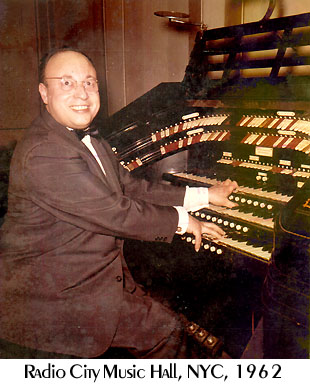 In a beehive
in Switzerland, I recorded miles of magnetic tape on my Nagra
recorder. When I returned to New York, I was able to produce the
melody of Rimsky-Korsakov's "Flight of the Bumble Bee"
using my recordings of the live bees. It took a titanic amount
of labor: 46 hours of cutting and gluing itsy-bitsy pieces
of magnetic tape (1.03 centimeters long) together for the final
result: 2 minutes of music. When I recall this episode, I think
I was a little crazy back then, but the result was so gratifying!
At that time, only 4-track tape recorders existed, so to complete
this piece Carroll obtained for me a Scully 4-track machine. I
recorded the melody (obtained from the bees) on one track, and
the accompaniment on the remaining three. What a job!
In a beehive
in Switzerland, I recorded miles of magnetic tape on my Nagra
recorder. When I returned to New York, I was able to produce the
melody of Rimsky-Korsakov's "Flight of the Bumble Bee"
using my recordings of the live bees. It took a titanic amount
of labor: 46 hours of cutting and gluing itsy-bitsy pieces
of magnetic tape (1.03 centimeters long) together for the final
result: 2 minutes of music. When I recall this episode, I think
I was a little crazy back then, but the result was so gratifying!
At that time, only 4-track tape recorders existed, so to complete
this piece Carroll obtained for me a Scully 4-track machine. I
recorded the melody (obtained from the bees) on one track, and
the accompaniment on the remaining three. What a job!
As far as random chance goes, in my musical creation it never played a predominant role. Surely chance exists at a certain level of inspiration in artistic creation, but a true creator must know how to use it without being dominated by it. It's the job of the creator to master chance. An artistic creation, whatever it is, is too important to be left entirely to pure randomness. As a source of inspiration, the artist must take into account but learn how to master it... and consider it as a wink of the eye from destiny.
In 1962, I had the extraordinary experience of playing one of the largest stages on the East Coast: the Radio City Music Hall of New York. I was there for six weeks, seven days a week, four times a day, in front of more than 6000 spectators at a time. This was fantastic and exhilarating. And in 1963, at a cocktail party, I had the luck to meet a man who for me was Merlin the Wizard: Walt Disney. We had several long conversations, during which he explained his views on the search for a perfect creation. He would say things like, "You must never let your creation get out of control. You must always improve it. Work, without respite. Perfect your work without interruption, without allowing random events to direct you."
He was an inspired person, a true giant of professionalism and one who could always be called a "great initiate." He always encouraged me to go further in my research and to be a perfectionist-I owe him a lot and pledge him eternal respect and veneration. Unfortunately, Walt left us in 1966, but for me he is still alive. Thanks again, Walt, for your teaching and your advice which I always try to follow to a "T"! Your suggesions and your advice were so precious and were always infinitely helpful to me during my entire career.
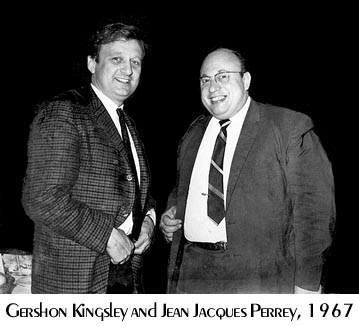 In 1964 at Carroll's,
I met a musician and composer of great talent, Gershon Kingsley,
and we became associates for a while. Together, using my new process
of rhythmic sequences of musique concrete, we elaborated the material
necessary to the realization of an LP of 12 original pieces for
the Vanguard Record Company, The In Sound from Way Out.
This was followed by a second album, Kaleidoscopic Vibrations,
using both the Ondioline and the Moog Synthesizer. These two albums
were reissued in 1988 on one compact disc called The Essential
Perrey and Kingsley. One of these titles of this second album,
"Baroque Hoedown," is still used at Disneyland in the
Main Street Electrical Parade. Another title, "The
Savers," became the basis for a TV commercial which in 1968
won the prestigious Clio Award. Gershon and I had met Robert
Moog in New York, and we made a number of TV appearances and
commercials using the Moog synthesizer and the Ondioline.
In 1964 at Carroll's,
I met a musician and composer of great talent, Gershon Kingsley,
and we became associates for a while. Together, using my new process
of rhythmic sequences of musique concrete, we elaborated the material
necessary to the realization of an LP of 12 original pieces for
the Vanguard Record Company, The In Sound from Way Out.
This was followed by a second album, Kaleidoscopic Vibrations,
using both the Ondioline and the Moog Synthesizer. These two albums
were reissued in 1988 on one compact disc called The Essential
Perrey and Kingsley. One of these titles of this second album,
"Baroque Hoedown," is still used at Disneyland in the
Main Street Electrical Parade. Another title, "The
Savers," became the basis for a TV commercial which in 1968
won the prestigious Clio Award. Gershon and I had met Robert
Moog in New York, and we made a number of TV appearances and
commercials using the Moog synthesizer and the Ondioline.
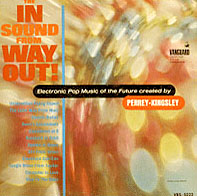 I also keep an
unforgettable memory of my sojourn to Montreal in 1965, when my
stage number, "Around the World in 80 Ways," was produced
at the Salle Bonaventure. It met with a lot of success and I appeared
on several Canadian TV shows. In Montreal, I encountered my friend
the stage magician Michel De La Vega, whom I had first
met in Paris while studying at medical school. We collaborated
on numerous TV shows. I then distanced myself from stage music
and jingle production to spend more time researching the influence
of sound on the human body, and created my second "sleep"
record.
I also keep an
unforgettable memory of my sojourn to Montreal in 1965, when my
stage number, "Around the World in 80 Ways," was produced
at the Salle Bonaventure. It met with a lot of success and I appeared
on several Canadian TV shows. In Montreal, I encountered my friend
the stage magician Michel De La Vega, whom I had first
met in Paris while studying at medical school. We collaborated
on numerous TV shows. I then distanced myself from stage music
and jingle production to spend more time researching the influence
of sound on the human body, and created my second "sleep"
record.
(Note: I must say that I
love and admire American a lot. It is the rare country where one
finds professionalism and exemplary perfectionism in the field
of show business and in the artistic world in general. Artists
are considered real human beings and not "products"
used to make money, as they are in France-especially at this time.
I understand how one would be proud to say, "I am an American
citizen.")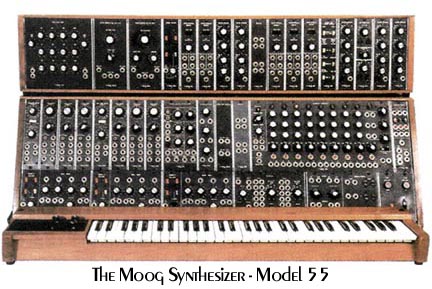
Anyway... I would return to France, sometimes twice a year. The fairy tale was continuing, because thanks to my stage act, I could travel for free First Class on the magnificent cruise liner, S.S. France, in exchange for three shows per cruise. So I was living the true life of a billionaire without being one. From 1962-1970, I did 18 round trips on the S.S. France, and met great personalities such as Alfred Hitchcock, who was a fascinating man-unusual and unpredictable. One never knew if he were joking or talking seriously. He was very impressed by the Ondioline and interested in my research; he encouraged me to continue. I met many other interesting personalities, but the list would be too long...
Each time I went to Europe, after only a few weeks I would return to New York, which attracted me like a magnet. I was always possessed by an intense desire to create... by an unqenchable thirst to accomplish more. I felt like I was living a hundred miles an hour. I was literally treating each day as if it were "the first day of the rest of my life."
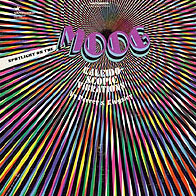 In 1968, I began
working with Laurie Productions in New York, with a great team
of professionals, including my friend John Mack and composer
Dave Mullaney. We did
TV commericals together, and at this time I recorded my 4th album
on the Vanguard label, Moog Indigo. I was at the apogee
of my American career-this was "the good life." I cherish
vivid memories of the '60s, not only because it was a time of
great personal success, but because it was a prolific period for
music in general. There have been other great "golden ages":
Mozart, Johann Strauss and Offenbach have marked their eras by
infusing humor into music. but in the '60s, humor sparkled in
the music like champagne...
In 1968, I began
working with Laurie Productions in New York, with a great team
of professionals, including my friend John Mack and composer
Dave Mullaney. We did
TV commericals together, and at this time I recorded my 4th album
on the Vanguard label, Moog Indigo. I was at the apogee
of my American career-this was "the good life." I cherish
vivid memories of the '60s, not only because it was a time of
great personal success, but because it was a prolific period for
music in general. There have been other great "golden ages":
Mozart, Johann Strauss and Offenbach have marked their eras by
infusing humor into music. but in the '60s, humor sparkled in
the music like champagne...
If we look at what has been happening during the past few years, we see humanity at a transition period. The era of Pisces is ending; little by little we are titlting into the age of Aquarius-and this does not happen without risk or inconvenience. Human beings are faced with numerous stresses: the eternal spectre of world war; the dangers of increasing pollution and vandalism; political scandals; recession; unemployment; anxiety at the coming of the Year 2000-and much more. Technology has developed faster than the general consciousness: spritual and moral values have not been preserved. Like Dr. Frankenstein, man has been surpassed by his own creation and technology. People feel a crippling desensitization.
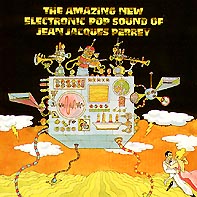 The human soul
has lost its sense of magic; people have lost their sense of humor
and everything is now banalized. Instead of "joie de vivre,"
people feel "mal de vivre." So the future is not what
it was, because humanity did not correctly manage its inheritance:
Planet Earth. Now everyone is increasingly worried, anxiety-ridden,
preoccupied and under pressure-and this generates sadness, intolerance,
and violence. This can be felt in contemporary music productions,
which always reflect not only the present but also what lies ahead.
The human soul
has lost its sense of magic; people have lost their sense of humor
and everything is now banalized. Instead of "joie de vivre,"
people feel "mal de vivre." So the future is not what
it was, because humanity did not correctly manage its inheritance:
Planet Earth. Now everyone is increasingly worried, anxiety-ridden,
preoccupied and under pressure-and this generates sadness, intolerance,
and violence. This can be felt in contemporary music productions,
which always reflect not only the present but also what lies ahead.
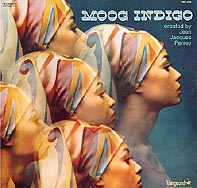 This is why I
always deliberately introduced humor into my creations: I sincerely
think that humor will help save humanity from the swamp into which
it is sinking. Today we can't afford to be pessimistic, so let's
try to keep a sense of humor bolted onto our hearts, soul, and
spirit! Let's shove pessimism aside for better days... when we
will be in better shape to handle it!
This is why I
always deliberately introduced humor into my creations: I sincerely
think that humor will help save humanity from the swamp into which
it is sinking. Today we can't afford to be pessimistic, so let's
try to keep a sense of humor bolted onto our hearts, soul, and
spirit! Let's shove pessimism aside for better days... when we
will be in better shape to handle it!
For family reasons, I had to return to France for good in 1970. I became an administrator and then the musical director of a French ballet company for three years. Because of my American experience, I was in demand to create radio and TV commercials "in the American way." I recorded other humoristic records, one for a Canadian company and 6 for a French company. I continued recording movie soundtracks in France and in Europe, plus jingles and cartoon music for French TV. I also oriented myself again toward research in therapeutic sounds, and my new "therapeutic prescription" was recently released... this time with the goal of inducing a state of relaxation and well-being in persons who are stressed and anxious.
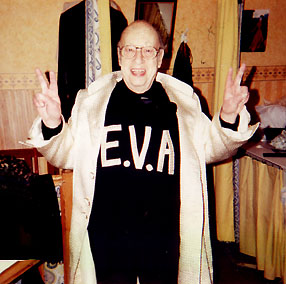 Mission: "continue"..."create"...these
obsessive words resound like a litany in my head. Yet the times
have changed. In France at present, in order to create, realize,
and especially produce, one has to have significant financial
backing. One must be part of the system. I know that I still have
a lot of things to do... just recently I had one of these luminous
ideas capable of revolutionizing the musical world, in a contemporary
style, by using modern technology. If somewhere in the world there
were a production company to trust me once again, I am sure they
wouldn't be disappointed. Edith, Jean, Walt, if you hear me up
there, please help me one more time! I still have one more message
of humor to give, and bursts of laughter to pass on.
Mission: "continue"..."create"...these
obsessive words resound like a litany in my head. Yet the times
have changed. In France at present, in order to create, realize,
and especially produce, one has to have significant financial
backing. One must be part of the system. I know that I still have
a lot of things to do... just recently I had one of these luminous
ideas capable of revolutionizing the musical world, in a contemporary
style, by using modern technology. If somewhere in the world there
were a production company to trust me once again, I am sure they
wouldn't be disappointed. Edith, Jean, Walt, if you hear me up
there, please help me one more time! I still have one more message
of humor to give, and bursts of laughter to pass on.
